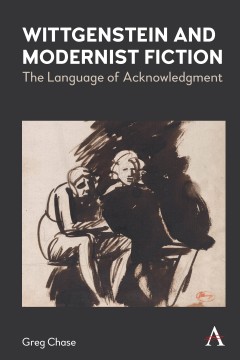Wittgenstein and Modernist Fiction
The Language of Acknowledgment
By Greg Chase
Other Formats Available:
- About This Book
- Reviews
- Author Information
- Series
- Table of Contents
- Links
- Podcasts
About This Book
Wittgenstein and Modernist Fiction: The Language of Acknowledgment shows how early twentieth-century economic and social upheaval prompted new ways of conceptualizing the purposes and powers of language. Scholars have long held that formally experimental novels written in the early twentieth century reflect how the period’s material crises—from world wars to the spread of industrial capitalism—call into question the capacity of language to picture the world accurately. This book argues that this standard scholarly narrative tells only a partial story. Even as signal modernist works by Virginia Woolf, Nella Larsen, William Faulkner, and others move away from a view of language as a means of gaining knowledge, they also underscore its capacity to grant acknowledgment. They show how language might matter less as a medium for representing reality than as a tool for recognizing others.
The book develops this claim by engaging with the philosophy of Ludwig Wittgenstein. Writing in 1945, in the preface to Philosophical Investigations, Wittgenstein laments, “It is not impossible that it should fall to the lot of this work, in its poverty and in the darkness of this time, to bring light into one brain or another—but, of course, it is not likely.” Worrying that “the darkness” of this historical moment renders his words unintelligible, Wittgenstein echoes the linguistic skepticism that scholars have found in literary modernism. But the Investigations ultimately pushes back against such skeptical doubts by offering a vision of language as a set of shared human practices. Even when it comes to a word like “pain,” which seemingly gestures toward something absolutely private and individual, Wittgenstein indicates that we learn what “pain” means by familiarizing ourselves with the contexts in which people use the term. In his pioneering reading of the Investigations as a “modernist” work, Stanley Cavell argues that Wittgenstein’s distinctive response to the problem of skepticism consists in the view that “other minds [are] not to be known, but acknowledged.”
The book argues that this concept of acknowledgment, as articulated implicitly by Wittgenstein and explicitly by Cavell, enables a broader reconceptualization of modernist fiction’s stance toward the referential capacities of language, and it bears out this claim by reading a series of modernist novels through the lens of Wittgenstein’s philosophy. From the residence halls of Cambridge to the farmsteads of rural Mississippians, the early decades of the twentieth century sowed serious doubts about the ability of individuals to find shared criteria for the meanings of words: the greater convenience of travel led to increased cross-cultural misunderstandings; technological developments facilitated new modes of race-, class-, and gender-based oppression, and two world wars irrevocably shattered an earlier generation’s optimism about the inevitability of political and moral progress. In this light, Wittgenstein and Modernist Fiction contends that modernist representations of consciousness strive to capture the inner lives of socially marginalized figures, seeking to facilitate new forms of intimacy and community amongst those who have survived crushing losses and been subject to deeply isolating social forces.
Reviews
“Wittgenstein and Modernist Fiction unsettles and displaces conventional understandings of literary modernism’s skepticism about the effectiveness of its own linguistic medium. It does so by calling attention to the historical and cultural contexts of linguistic skepticism in novels by a wide range of modernist writers, from Ford, Forster, and Woolf to Faulkner, Larsen, and Ellison. The philosophy of Wittgenstein and Cavell enable Chase to move beyond abstract questions of knowledge to an embodied ethics of acknowledgement. The result is a strikingly original and valuable contribution to a growing body of scholarship on Wittgenstein and literary modernism.” Michael LeMahieu, Clemson University, US
Author Information
Greg Chase holds a PhD in English and American Literature from Boston University and teaches at the College of the Holy Cross.
Series
Anthem Studies in Wittgenstein
Table of Contents
Acknowledgments; List of Abbreviations; Introduction: Modernist Philosophy and Modernist Fiction; 1. “Who’s ‘We’?”: Claims to Community in Forster’s Howards End and Woolf ’s Mrs. Dalloway; 2. “The Silent Soliloquy of Others”: Wittgenstein’s Pursuit of Acknowledgment; 3. “To See with the Same Eyes”: Marriage and Same- Sex Intimacy in Ford, Woolf, and Larsen; 4. Fragmenting Families, Private Language Fantasies: Faulkner’s The Sound and the Fury and As I Lay Dying; 5. Seeing Humans as Humans: Wright’s Black Boy and Ellison’s Invisible Man; Conclusion: Afterlives of Acknowledgment; Notes; Bibliography; Index.
Links
Stay Updated
Information
Latest Tweets



